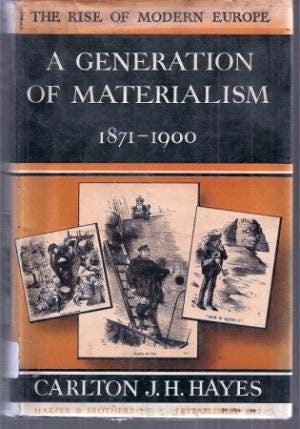Imperialism in A Generation of Materialism

I highly recommended Carlton Hayes‘ A Generation of Materialism, 1871-1900. It chronicles a great tragedy. During this period, the economic, technological, and scientific fruits of the Enlightenment reached historic highs. But intellectual appreciation of the Enlightenment rapidly drowned beneath the twin waves of nationalism and socialism – paving the way for World War I, Communism, Nazism, World War II, and the Cold War. This would have been pathetic enough if wise intellectuals were overpowered by the benighted masses. But with few exceptions, contemporary intellectuals led the attack on the Enlightenment – or, more precisely, pretended it never happened. Though Hayes is basically a Wilsonian progressive, his story has an intensely Randian feel.
A Generation of Materialism is sweeping in scope, but the chapter on imperialism was one of my favorites. Here’s one eye-opening passage on the history of imperialism:
[T]he immediately preceding era of Liberal ascendancy, say from the 1840’s into the 1870’s, had witnessed a marked decline of European imperialism. There had been, to be sure, some spasmodic additions to British India, some scattered efforts of Napoleon III to resuscitate a colonial empire for France, some continuing Russian expansion in central and northeastern Asia. Although China and Japan had been forcefully opened to European (and American) trade, the opening had been for practically everybody on free and equal terms and had been unattended by any considerable expropriation of territory. The surviving farflung British Empire had ceased to be an exclusive preserve for British merchants since the 1840’s, and in 1861 France had freely admitted to her colonies the commerce of all nations. In 1870-1871 European colonialism appeared to be approaching its nadir. Gladstone was prime minister of Great Britain, and he was notoriously a “Little Englander.” The provisional French government so slightly esteemed the colonies it had inherited that it offered them all to Bismarck at the end of the Franco-Prussian War if only he would spare Alsace-Lorraine.
How different the 20th century might have been if Bismarck had accepted that offer!
I first read Hayes in high school, learning European history from his delightful Political and Social History of Modern Europe. In hindsight, he’s a precocious proponent of behavioral political economy. Behold:
The actual course of empire – the order in which distant areas were appropriated by European powers – was determined less by design than by chance. Murder of a missionary or trader and consequent forceful intervention might occur anywhere. In some instances, curiously frequent in Moslem countries, native rulers practically invited intervention by living far beyond their means and contracting debts which they were unable to repay… For example, the Khedive Ismail of Egypt, a squat red-bearded gentleman with a passion for ostentation and the externals of European culture, spent half a billion dollars in the twelve years after his accession in 1863, running up the Egyptian public debt from 16 million to 342 million and continuing to borrow money from European bankers at ever more onerous rates… In 1876 he sold his shares of the Suez Canal Company stock to England, and consented to joint supervision of his finances by representatives of England, France, Italy, and Austria… No doubt bankers and investors egged on both the khedive to spend and the English government to collect, but a less prodigal khedive, and one more intelligently concerned with the welfare of his subjects, might have staved off foreign rule. The contemporary Mikado of Japan did.
If you want to know what an erudite, opinionated historian thought in 1941 about the period from 1871-1900, this is the book for you!
The post appeared first on Econlib.



